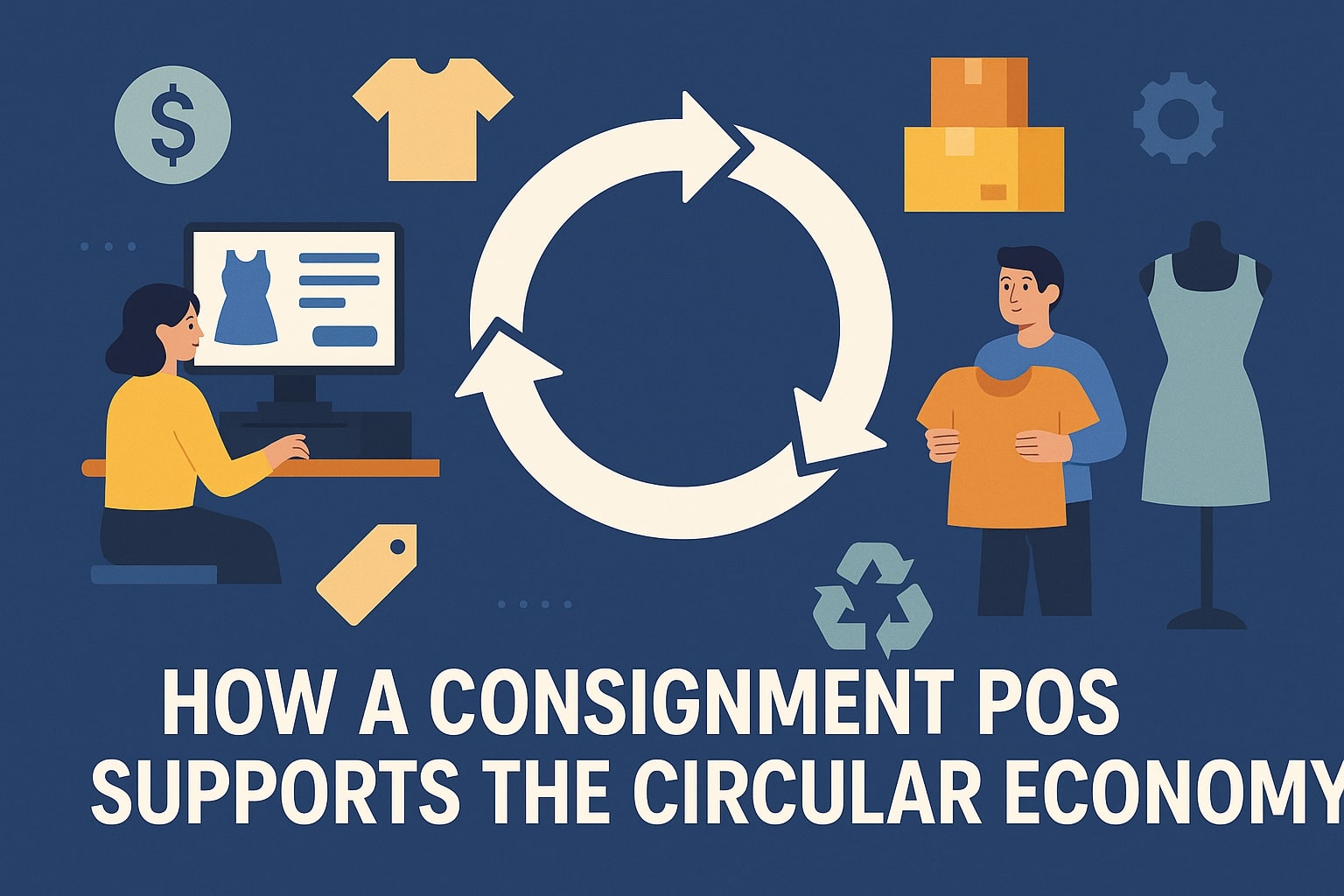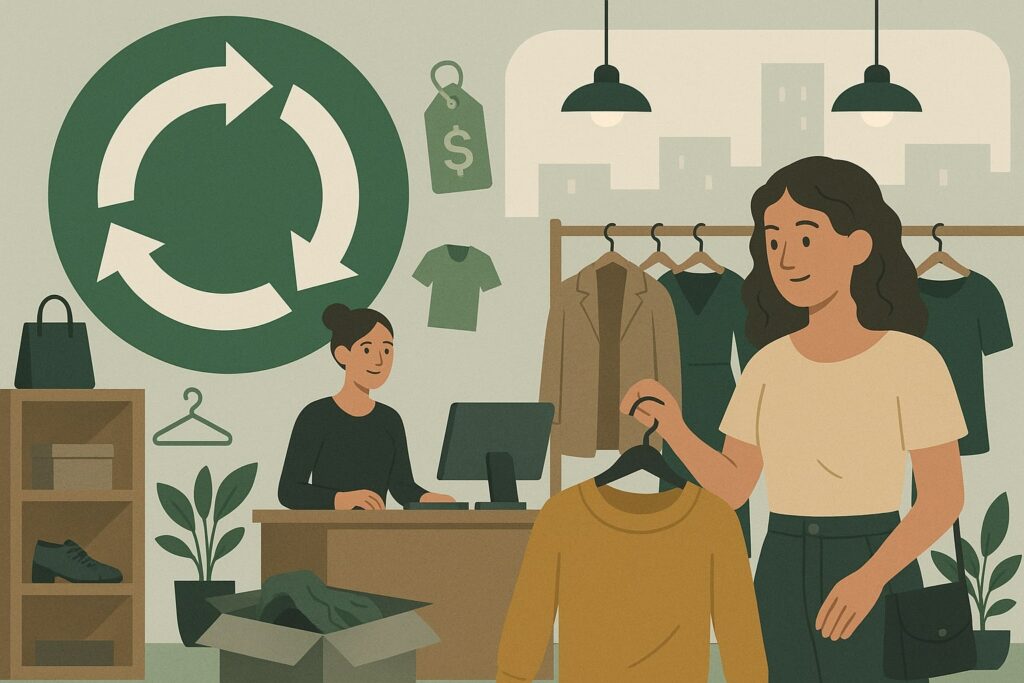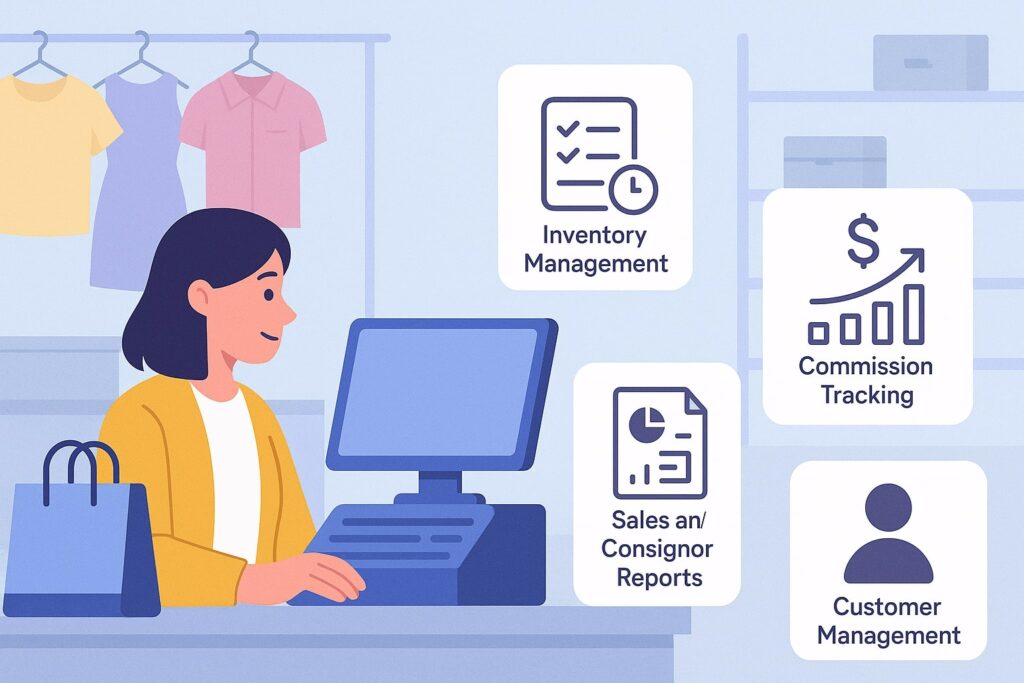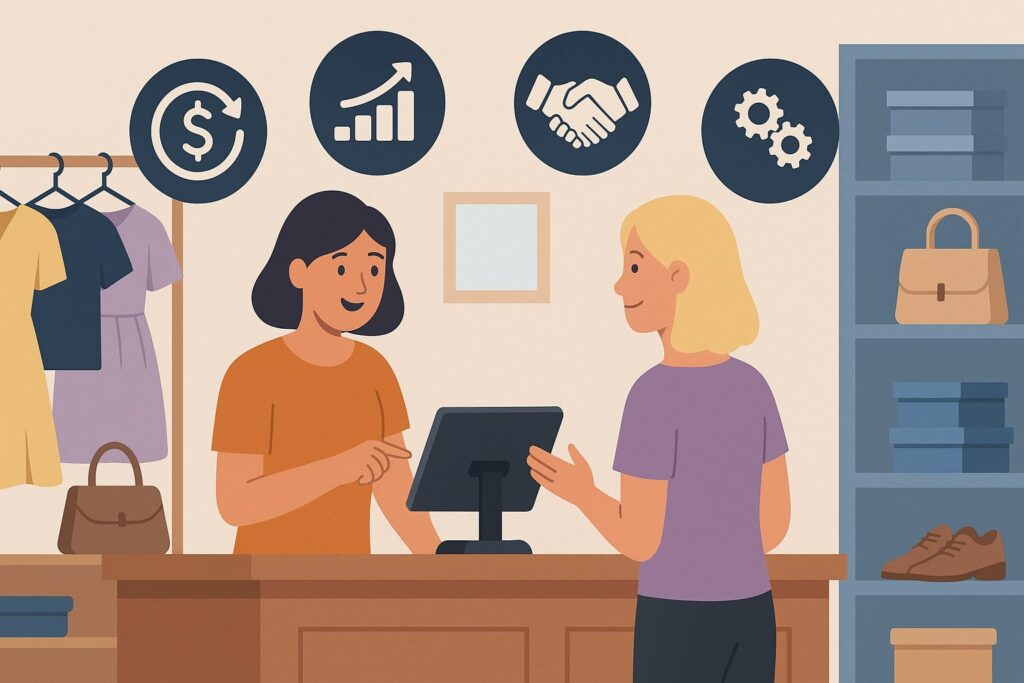
By consignmentpos September 13, 2025
In a circular economy, products are kept in use and waste is minimized. Consignment retail embodies this model: it gives pre-owned items a second life, extending product lifespans instead of sending goods to landfill.
A specialized consignment point-of-sale (POS) system helps track each unique item, manage consignor payouts, and automate sales. By reducing manual errors and speeding operations, consignment POS software lets store owners focus on growth while reinforcing sustainable reuse.
Consignment Stores in the Circular Economy

Consignment shops are key players in sustainable commerce. They sell used clothing, furniture, electronics and more, which extends product life and cuts waste. Each consigned sale is one less new product needed, keeping items out of landfills and saving resources.
This reuse approach directly reduces environmental impact: it avoids new manufacturing, saving water, energy and carbon emissions.
- Extended Life: Every consigned item sold delays its disposal and reduces demand for newly manufactured products.
- Lower Footprint: Reuse avoids new production (and its pollution), significantly cutting resource and energy use.
- Quality & Durability: Consignment often highlights well-made, long-lasting goods rather than cheap disposables. This discourages a throwaway culture.
- Conscious Consumption: Shoppers at consignment stores tend to shop more mindfully, choosing sustainable options over impulse buys.
Growing Market: The U.S. resale market is booming. It’s expected to hit about $73 billion by 2028, and roughly 12–15% of Americans shop consignment or thrift each year. This reflects a strong consumer shift toward reuse.
What Is a Consignment POS System?
A consignment POS is retail software built for secondhand stores. Unlike a regular cash register, it tracks inventory on a per-item basis. Each product’s status, price and owner (consignor) are recorded at intake.
When an item sells, the software automatically allocates the correct split of proceeds between the store and the consignor. In effect, the POS handles the complex accounting of consignment models. This automation eliminates duplicate entries and costly mistakes, ensuring accurate payments and taxes.
Key Features of Consignment POS Software

Modern consignment POS platforms pack features that streamline resale operations and strengthen the circular economy:
- Item-Level Inventory: Tracks every consigned product by barcode or serial number. Details such as description, purchase date, condition and price are stored in the system. This fine-grained tracking ensures nothing is lost or forgotten.
- Consignor Management: Automates consignor accounts and commission splits. The POS can program each item’s selling price and consignor’s share, then automatically calculate payouts when sales occur. This transparency builds trust and encourages people to contribute more used items.
- Multi-Channel Selling: Integrates with online storefronts and marketplaces. Consignment systems can sync inventory with e-commerce platforms (e.g. Shopify) or list items on sites like eBay or Amazon. This broadens the audience for secondhand goods and speeds up reuse.
- Advanced Reporting & Analytics: Provides real-time sales, inventory and customer data. Store owners can view metrics on-demand and even track sustainability impacts (such as CO₂ and water savings per item). These insights help optimize stock and highlight the store’s eco benefits.
- Flexible Checkout: Supports all payment types (credit/debit cards, ApplePay, etc.) and digital receipts. A modern, mobile POS terminal makes checkout fast and seamless, improving the shopping experience and reducing paper waste.
- Cloud-Based Access: The system and data live in the cloud. Store owners can manage inventory, view sales reports and process transactions from any device. This flexibility is ideal for owners who travel or manage multiple locations.
- Integration with Other Software: Links to accounting tools (like QuickBooks) and marketing platforms. Data flows automatically into bookkeeping, and POS data can feed loyalty programs or email campaigns.
These specialized features ensure that consignment stores run smoothly and that used items circulate efficiently in the economy.
Benefits of Consignment POS for Small Businesses

A consignment POS system offers clear advantages for store owners and staff:
- Time Savings: By automating intake, pricing and payouts, POS software saves staff 50–70% of admin time compared to manual methods. Employees spend less time on paperwork and more time serving customers.
- Fewer Errors: Automated calculations prevent costly mistakes in commissions and taxes. Consistent settings (tax rates, discounts and split percentages) are applied at the register, regardless of who rings up the sale.
- Improved Customer Service: Faster, mistake-free checkouts lead to happy customers. Modern POS terminals with integrated card payments and digital receipts speed up transactions. Loyalty programs and gift cards can be managed in the same system, encouraging repeat visits.
- Remote Management: Owners can access their business from anywhere. Cloud reporting lets managers review daily sales or stock levels on their phone or laptop. This freedom is especially helpful for small business owners who wear many hats.
- Data-Driven Decisions: Built-in reporting and analytics reveal best-selling categories, peak shopping times and inventory turnover rates. These insights help owners stock smarter (ordering items more likely to sell) and run targeted promotions, ultimately boosting profits.
In short, consignment POS technology makes operations leaner and more profitable. By handling manual chores and organizing data, the software gives businesses room to grow.
Supporting Sustainability with Technology
Beyond business efficiency, consignment POS systems actively promote greener practices. By accurately logging every secondhand sale, they ensure more items re-enter circulation. Each sale of a used product saves on new production — meaning less raw material extraction and lower energy use.
Some advanced POS platforms even include sustainability tracking, quantifying the carbon and water savings from resold goods. Visibility into these impacts can reinforce the eco-friendly story for shoppers and staff.
- Measure Impact: Modern software may calculate environmental savings per item (e.g. “By selling this sofa used, we saved 50 kg of CO₂ emissions!”). These metrics highlight the positive effect of each consignment sale.
- Lower Demand for New: Every reused product means one fewer new item needed. Consignment shops, aided by POS tracking, thus contribute to conserving resources and shrinking overall waste.
- Encourage Repair & Reuse: Some POS systems can manage repair orders or refurbished inventory. For example, a store may record items sent for fixing before resale. This fully embraces the circular goal of reuse over replace.
- Affordable Sustainability: By streamlining operations, POS software helps stores keep prices low. More people can then afford quality secondhand goods. This democratizes eco-friendly choices – a core circular economy principle.
In effect, the technology acts as a multiplier. It makes each item’s second life easier and more profitable, which in turn boosts the overall circular flow of goods and materials.
Expanding Circular Retail Models
Consignment POS software often supports other reuse-based business models as well. Features for recommerce help stores do even more with used items:
- Buy-Back Programs: Track and resell items the store purchases outright from customers. These bought-back goods become part of inventory, all managed in the same system.
- Trade-In Upgrades: Manage customer trade-ins for credit. For example, a retailer can accept an old bike and credit the customer for a new one, with the system handling the accounting.
- Rentals & Subscriptions: Some POS platforms include rental modules. Stores can rent furniture or electronics and track returns, keeping items in use rather than discarded.
- Repairs & Refurbishment: Record items sent out or done in-house for repair. When fixed, products can be put back on sale. This process extends product lifespans and prevents premature waste.
- Marketplace Integration: List inventory on online marketplaces. When an item sells, the POS auto-updates stock. This feature turns every unsold consignment into a potential online sale.
By supporting buy-back, rentals, and other programs, a consignment POS makes it practical for any store to adopt a full circular retail strategy.
Impact on People and Community
Consignment retail and its supporting POS technology benefit people as much as the planet. They create a win–win situation:
- Budget-Friendly Finds: Customers can buy high-quality goods at a fraction of the new price. This saves money for families and encourages more sustainable lifestyles.
- Earning & Empowerment: Sellers (consignors) earn cash from items they no longer use. Instead of throwing things away, they contribute to a reuse cycle while improving their own finances.
- Local Business Support: Most consignment stores are small, locally owned shops. Every transaction done through them keeps money in the neighborhood and sustains jobs. The POS helps these owners run professional stores, reinforcing community roots.
- Accessibility: By lowering costs and increasing inventory variety, consignment shops make eco-friendly shopping accessible to more people. They transform sustainability from a niche ideal into everyday habit.
Through these channels, consignment POS systems help build stronger, more sustainable communities. They ensure that environmental benefits translate into real value for people.
Best Practices for Adopting Consignment POS
To maximize impact, store owners should choose POS software tailored to consignment needs. Look for features like item scanning, consignor accounts, and inventory aging reports. Train staff to use the system fully (accurate tagging and timely entry are key). Use data reports to guide purchasing decisions and promotions.
For example, if the POS shows certain items sitting too long, consider markdowns or bundles. Also, leverage customer data: loyalty programs and personalized marketing campaigns (built into many POS systems) can encourage repeat business.
Finally, be transparent with consignors by providing them access to their sales reports. Clear communication (often via integrated seller portals) builds trust and keeps the circular cycle going strong.
Frequently Asked Questions
Q: What exactly is a consignment POS system?
A: It’s a point-of-sale software designed for consignment or resale retailers. Unlike a regular cash register, it handles unique tasks like tracking each used item, managing consignor accounts, and calculating profit splits. It automates inventory and payment calculations so the store owner doesn’t have to do it manually.
Q: How do consignment stores help the circular economy?
A: By selling pre-owned goods, consignment stores keep products in use longer instead of throwing them away. This reuse means fewer new products are made, conserving resources and reducing waste. Each consignment sale directly cuts landfill volume and carbon emissions.
Q: What kinds of businesses use consignment POS software?
A: Any retailer selling goods for others can use it. Common examples include secondhand clothing boutiques, antique and furniture shops, electronics recyclers, sports and music gear stores, and more. Even shops that do buy-backs or operate vendor malls benefit from consignment POS features.
Q: Can a consignment POS handle taxes and accounting?
A: Yes. These systems usually have built-in tax calculations and can integrate with accounting tools. For instance, they automate end-of-day processes so no manual reconciliation is needed. This ensures sales taxes are applied correctly and financial reports stay balanced.
Q: How does consignment POS support sustainability goals?
A: By efficiently managing the sale of used goods, the POS increases the volume of goods that get reused. Advanced systems even track the environmental impact of sales (e.g. CO₂ savings). In practice, the POS enables stores to move more items to new owners, which is a core element of a circular economy.
Conclusion
Consignment POS systems bridge retail technology with sustainable practice. They make it easy for small businesses to run professional stores that specialize in reuse and recycling. By automating transactions, tracking every item, and providing data insights, these systems help stores sell more secondhand goods accurately and efficiently.
This not only boosts profits and customer satisfaction but also maximizes each item’s useful life. As the resale market grows, consignment shops and their POS technology will be crucial to the circular economy.
They empower people — shoppers, sellers and owners — to support sustainability while enjoying economic benefits. In this way, a good consignment POS is more than just software: it’s a partner in building a greener, more circular future.